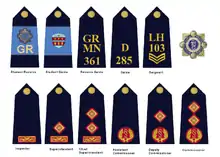Garda Síochána Reserve
The Garda Síochána Reserve (Irish: Cúltaca an Gharda Síochána) is the volunteer part-time section of the Garda Síochána, the national police force of Ireland. It was created in 2006. The first 36 reserves graduated on 15 December 2006, at the Garda College in Templemore.[1]
| Garda Síochána Reserve Cúltaca an Gharda Síochána | |
|---|---|
 Badge of An Garda Síochána | |
| Agency overview | |
| Formed | 2006 |
| Jurisdictional structure | |
| Operations jurisdiction | Republic of Ireland |
| Constituting instrument |
|
| General nature | |
| Operational structure | |
| Parent agency | Garda Síochána |
Establishment
The Garda Síochána Act 2005 provides for the establishment of a Garda Reserve, consisting of approximately 1,000 people, or 10% of the regular force. Its purpose is to supplement the work of Garda Síochána's regular members.[2] The first 900 recruits to the Reserve were expected to be in place by September 2006. As of February 2015, 1164 Reserve members were deployed. As of 13 October 2016, there were 789 Garda Reserve members with further training scheduled for 2017[3][4] The Reserve carries out duties defined by the Garda Commissioner and sanctioned by the Minister for Justice.
Function and training
The Garda Reserve is intended as a source of local security and information. It provides local patrols and participates in crime-prevention initiatives in local problem areas.[5] The legal powers of its members are defined and managed at the commissioner's discretion.
Reservists receive training in Irish law, self-defense, restraint, human rights, Garda procedures and discipline. They must work under the supervision of, and be accompanied by, regular members of the force. Reservists have no set amount of time to work; but in order to gain the right to expenses, they must work a minimum of 208 hours per year, with a minimum tour duration of 4 hours.
Training Programme
- Phase I – Two-day induction course (weekdays) at the Garda College, Templemore, County Tipperary: Garda Síochána, Human Rights, Discipline, Ethics and Organisational Culture
- Phase II – A 2-week all-inclusive course held at the Garda College (Monday–Friday, not including weekends): Retractable Baton, Incapacitant Spray, Tetra Radio
- Phase III – Two day Course (Weekdays) at the Garda College
- Phase IV – Minimum of 40 hours on-the-job training at a designated Garda Station, including accompanied beat patrol and station duty
- Phase V – 1-day attestation and graduation ceremony, held on a weekday at the Garda College[6]
Reservist duties include station duty (other than care and custody of detained persons), staffing of communications rooms, foot patrolling, static security duty, event policing, preservation of crime scenes, attendance as court witnesses, and assisting at road traffic checkpoints, collisions, fires, and other occurences.
Limited powers
Reserve Gardaí wear the same uniform as regular members, with the letters GR on the shoulder number to distinguish themselves as reserve members. Reservists are permitted limited access to the PULSE system. They are not deployed in plain clothes, or allowed to carry firearms.
Duties and powers assigned to reservists are commensurate with their training, and primarily involve legislation relating to road traffic,[7] public order,[8][9][10][11] drugs, theft and burglary.

Reservists's powers are controlled and amended at the discretion of the Garda Commissioner in accordance with Section 15 of the Garda Síochána Act 2005. Since 28 May 2007, these powers have encompassed limited Road Traffic Act powers and Section 4 of the Criminal Law Act 1997.[12]
Additional reservist powers were announced by Alan Shatter, the previous Minister of Justice, including powers to deal with public order offences and the seizure of vehicles in accordance with Section 41 of the Road Traffic Act 1961. These powers were granted on a phased basis, and implemented by the end of 2012. In 2015, the Minister for Justice and Equality, Frances Fitzgerald, confirmed the introduction of these powers.[13]
References
- "First Garda Reserve members graduate". RTÉ News. RTÉ. 15 December 2006. Archived from the original on 22 October 2007. Retrieved 26 May 2007.
- "Garda Síochána Act 2005". Act No. 20 of 2005.
- "Garda Reserves to receive greater powers". RTÉ News. Archived from the original on 13 May 2016. Retrieved 23 April 2016.
- "Garda Reserve: 13 Oct 2016: Written answers (KildareStreet.com)". kildarestreet.com. Archived from the original on 7 February 2017. Retrieved 16 November 2016.
- "About the Garda Reserve". An Garda Síochána. Archived from the original on 25 April 2016. Retrieved 20 April 2016.
- Síochána, An Garda. "Garda Reserve – An Garda Síochána – Ireland's National Police Service". garda.ie. Archived from the original on 21 November 2016. Retrieved 20 November 2016.
- "Road Traffic Act 1961". Section 41, Act No. 24 of 1961. Archived from the original on 25 April 2016. Retrieved 23 April 2016.
- "Criminal Justice (Public Order) Act, 1994". Section 8, Act No. 2 of 1994. Archived from the original on 2 May 2016. Retrieved 23 April 2016.
- "Criminal Justice (Public Order) Act, 1994". Section 21, Act No. 2 of 1994. Archived from the original on 25 April 2016. Retrieved 23 April 2016.
- "Criminal Justice (Public Order) Act, 1994 Section". Section 22, Act No. 2 of 1994. Archived from the original on 26 April 2016. Retrieved 23 April 2016.
- "Criminal Justice (Public Order) Act, 1994". Section 24, Act No. 2 of 1994. Archived from the original on 25 April 2016. Retrieved 23 April 2016.
- "Irish Statute Book, Acts of the Oireachtas, Garda Síochána Act 2005". Section 15, Act No. 20 of 2005. Archived from the original on 29 September 2007. Retrieved 28 May 2007.
- "Garda Reserves to receive greater powers". RTÉ News. Archived from the original on 13 May 2016. Retrieved 23 April 2016.